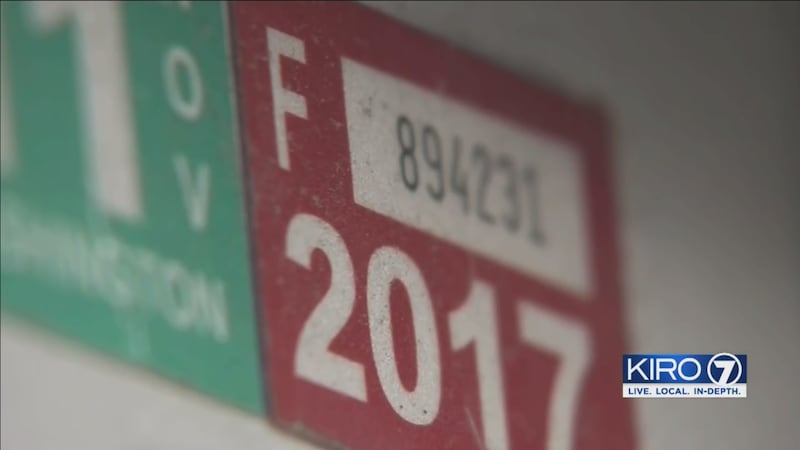As the controversy over high car tab prices continues, the Washington State Supreme Court on Tuesday
heard a lawsuit filed by taxpayers against Sound Transit.
The argument is that the full text of the vehicle valuation system Sound Transit would use wasn't included in ST3 -- the $54 billion light rail expansion plan approved by voters in 2016 -- and
violated the state constitution.
When tab renewals arrived in mailboxes, few were prepared for the big hike. Some saw an
increase of hundreds of dollars.
Under ST3, cars are taxed on a state depreciation scale based on the manufacturer's suggested retail price, which is usually far higher than a car's real value.
Pierce County Superior Court Judge Kathryn Nelson shot down the lawsuit last year, but those pushing against the higher car tab fees vowed to take the matter to the state Supreme Court.
The suit says Sound Transit should return hundreds of millions of dollars it collected since the light rail expansion projects were started.
If the lawsuit is won, projects such as the half-built Northgate light rail station could potentially lose much of their funding.
Sound Transit argues the lawsuit is "factually and legally wrong" and says the loss of funding would have huge impacts on ongoing construction.
"If we tried to complete the whole project and were delayed five years, that would add another $26 billion to the package in front of voters and that would extend the taxes to 2060, instead of 2041," said Redmond Mayor John Marchione.
Sid Maietto and his wife own two cars.
"It totaled about $1,100 and I said, 'A $700 swing -- something's awry,'" Maietto told reporters. He's among the opponents of the 2016 Sound Transit 3 ballot measure who sued the agency.
"That's what led me to this, my own sticker shock," he said.
When the Legislature passed the law that allowed Sound Transit to collect car tab fees, that law referred to another law that contains a formula for calculating car values.
The new law did not actually spell out the formula, which attorney Joel Ard said is unconstitutional.
"What the constitution says is that the Legislature has to show its work. You heard that doing math in third grade and it's still true," Ard said.
Sound Transit says the law was perfectly legal and legislators knew what they were voting on.
"The purpose of the statute is not to allow to taxpayers to calculate their taxes, it is to delegate authority to the local jurisdiction to impose a tax," said Sound Transit General Counsel Desmond Brown.
The group suing the agency wants taxpayers to be refunded their car tab fees until the law is fixed.
Sound Transit says it could lose $15 billion to $18 billion for building light rail that gets people out of traffic.
"Without that revenue, we would have to eliminate or substantially delay a number of major projects," Brown told the justices.
It is not known when the justices will issue a ruling.
There's another threat to Sound Transit funding in Initiative 976, a measure on the November ballot to limit all future car tabs to $30. The initiative would gut transportation funding across the state.
Sponsor Tim Eyman was in the Supreme Court for Tuesday's hearing.
More news from KIRO 7
- Seattle police runners-up in CBS' ‘Lip Sync to the Rescue' competition
- Teachers, students leave King's Schools over anti-gay religious beliefs
- Taxpayers' lawsuit against Sound Transit car tab hike in court
- Mother demands justice for son killed by Tacoma officer
- Do you have an investigative story tip? Send us an email at investigate@kiro7.com
Cox Media Group








